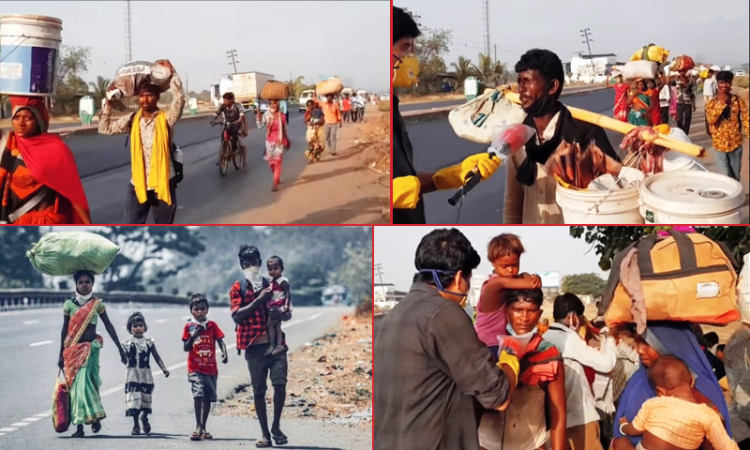Supreme Court Fails Once Again During (Covid) Emergency
Yogesh Pratap Singh & Lokendra Malik
25 May 2020 12:24 PM IST

Discontent, popular and professional, with the judicial process and the legal system is not a new phenomenon. However, credibility of institutions is tested during times of crisis because credibility is the bedrock of any crisis stress test. The 1975 National Emergency which suspended the constitutional guaranty of life and liberty, tested the credibility of Supreme Court (SC) and it failed miserably by ruling that habeas corpus, stood suspended in times of Emergency. This decision encouraged the government to illegally detain thousands of people. The New York Times named it Indian Supreme Court's "utter surrender" to an absolutist government.
Democracy survived. Judges apologized by saying that "I was wrong. The majority judgment was not the correct judgment. If it was open to me to come to a fresh decision in that case, I would agree with what Justice H. R. Khanna did. I am sorry (for the judgment)"…. Justice Bhagwati observed 35 years later.
To wipe out this dark spot on its face, SC composed a new phase of "judicial activism and did an incredible good work for underprivileged, disadvantaged and illiterate sections of the society. The Supreme Court rejuvenated trust in the institution and became a people's court. It pronounced several judgments for betterment of human conditions and dignity.
But, adversity has struck once again. A situation nothing less than emergency has knocked the doors of the SC but it once again failed and allowed the government to violate fundamental rights in the name of un-declared emergency. The recent judicial trend has created a general perception that the Supreme Court in the recent past has helped the Government in all cases involving high-stake such as Ram Temple, Rafael Case, Judge Loya death etc to name a few. It also refrained from examining legal and constitutional challenges posed to the Centre's decision on Article 370 that changed the constitutional status of Jammu and Kashmir. But, most surprisingly, it did not entertain even the habeas corpus petitions which threatened the life and liberty of people of state. On the contrary, the Court pointed out that the petitions suffered from serious defects and had no meaning. The Court even decided to give the Government more time to review the situation after the authorities said that the restrictions would be eased soon. There was no justification for the SC to adjourn matters that involved a person's liberty.
Migrant Workers Cases : SC Failed To Rise To The Occasion
The worst was yet to come. The SC Bench consisting Justices L Nageswara Rao, Justice Kaul and Justice Gavai dismissed a petition seeking directions to the Centre to ask all District Magistrates to identify stranded migrant workers and provide shelter, food to them before ensuring their free transportation to native places. The hearing came a day after fourteen migrant workers were killed in two separate accidents in Uttar Pradesh and Madhya Pradesh and more than 60 people were injured.
The central government in its attempt to combat the coronavirus pandemic with an unprecedented total lockdown on a four hours' notice suddenly put millions of people at risk, leaving many struggling with basic requirements of food and medicines. No joint intensive advisory along with logistic support arrangements were issued appealing to the people to avoid leaving their homes except in an emergency. Governments made promises but it was not executed on ground. The efforts of the Union and the state governments have either not been orchestrated in sync or have not been implemented properly. It was simply a matter of survival for them. They were left with a choice between the coronavirus infection and starvation. Hunger is the more desperate, deadly, and immediate of the two alternatives, and hence it prevailed. Lockdown was a state action which directly and severely affected the right to livelihood, a most cherished interpretation of Article 21 made by the Supreme Court where it had observed that the "right to life does not merely include an 'animal existence', but a life with dignity." The dynamic human dignity jurisprudence developed by the SC was extended to include right to livelihood, shelter and healthy environment. Therefore, to deprive a person of his right to livelihood would deprive him of his life [See Olga Olga Tellis v Bombay Municipal Corp. (1985) & D.T.C. v Madzoor Congress]. The SC also affirmed that the judiciary is duty-bound to examine the actions of the state, and hold it up against constitutional standards.
The Bench led by Justice L. Nageswara Rao observed "How can anyone stop this when they sleep on railway tracks?" "There are people walking and not stopping. How can we stop it?" In an earlier PIL filed in the Supreme Court on 01 April 2020, asking the state to pay minimum wages to migrant workers a bench asked "why wages are required when meals are being provided by the government?" It is "impossible for this court to monitor who is walking and not walking." This approach of the Supreme Court towards helpless migrant workers is disappointing and against the established jurisprudence. It refreshed the agonising memories of the despotic Emergency of Mrs. Indira Gandhi.
Rising pendency with a backlog touching 3.3 crore cases, judicial appointments under executive pressure, frequent corruption charges in SC, open differences between senior judges on crucial matters including appointments, alleged sexual harassment against CJI, judges praising executive openly and SC constantly siding with the government have become a new normal in the Supreme Court. But, this precarious trend has now reached to a dangerously low level with its recent attitude on migrant workers. SC's reputation as people's court is shattered. Fears are mounting that this current judicial recession could be more deep and lengthy, with recovery limited by continued anxiety.
Views Are Personal Only.
(Authors are Professor of Law, NLU Odisha and Practicing Advocate, Supreme Court of India respectively)


